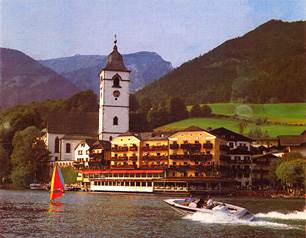WHITE HORSE INN
Adapted by Hans Muller and Erik Charell, from a play by Blumenthal and Kadelburg : Original Lyrics by Robert Gilbert. Music by Ralph Benatsky and Robert Stolz
English Book and Lyrics by Harry Grun: The whole adapted by Eric Maschwitz and Bernard Grun
Produced at the London Coliseum, 8 April 1931
Story
Head waiters of White Horse Inn have found that to fall in love with the attractive young widow who owns the establishment is a swift and certain route to dismissal. Yet none have been able to resist Josepha; least of all Leopold, the present incumbent. She, however, pines for Valentine Sutton, a regular visitor from England, and is resolutely blind to all the evidence that his thoughts for her are no more than warm friendship. Valentine's annual visit is at hand, and by the same steamer arrive Ebenezer Grinkle, a self-made lad from Lancashire with plenty of brass, his sweet young daughter Ottoline, an impoverished Professor Hinzel and his gawky, lisping, but appealing daughter Gretel, and a dapper young man, Sigismund Smith (of Hammersmith). Sub-plots abound as Smith and Grinkle discover they are hated business rivals. Sutton (who is Smith's solicitor) falls in love with Ottoline, and Smith with Gretel, while Leopold repeatedly threatens to resign and wish them all a last "Good-bye!" The subsequent arrival of His Imperial Majesty the Emperor serves at first only to add to the acrimonious chaos, but finally his kindly understanding and wisdom do much to bring about the statutory happy ending.
 |
The White Horse Inn today |
For the Chorus
It is difficult to open the vocal score at a page which does not contain work for chorus and/or dancers. Undoubtedly a "big company" production, strong harmony singing is essential, with six-part chorus work the rule rather than the exception. Sufficient chorus voices have to be mustered to produce a rich volume of sound even when half the members are off stage awaiting a separate entrance later in the same musical item. There are many attractive and spectacular dance sequences. The chorus appear as villagers, chambermaids, Alpine guides, tourists, hotel guests, porters, dairymaids, waiters, gamekeepers, and in many minor and non-speaking roles.
Singing Principals
- Josepha.
- Ottoline.
- Kathi, a postwoman.
- Gretel.
- Leopold.
- Sutton.
- Sigismund.
- Grinkle.
Straight Roles
- The Emperor.
- Professor Hinzel.
- Karl, a lad employed at "White Horse Inn".
Smaller Roles:
- Zenzi, a goatherd girl.
- The lady secretary to the Mayor.
- Franz, a senior Waiter at "White Horse Inn".
- The Mayor.
- The Head Forester.
- Ketterl, aide-de-camp to the Emperor.
- The Landlord of The Travellers' Rest.
The Scenes
- Act I Outside White Horse Inn. A cow-shed (front drop)
- Act II Outside White Horse Inn. The pine woods (front drop). The Mayor's parlour (front drop). The cow-shed (front drop)
- Act III Outside White Horse Inn. Outside The Travellers' Rest, high in the mountains (front drop or inset)
Orchestration
1st and 2nd Violins, Viola, Cello, Double Bass, Flute, Oboe, 1st and 2nd Clarinets, Bassoon, 2 Horns, 2 Trumpets, 2 Trombones, Drums, Harps.
Stage band cards can be provided for Clarinet, Trumpet, Trombone and Drum, but their work is fully scored for pit orchestra